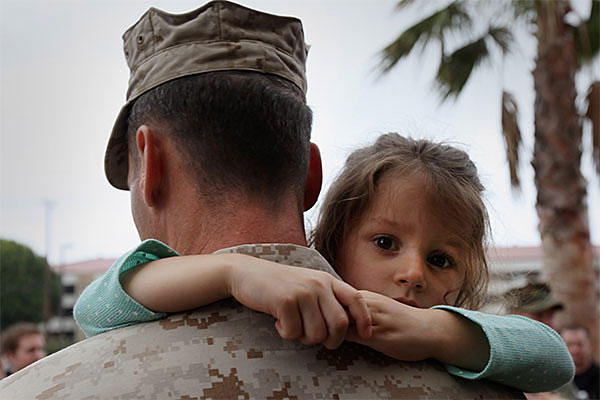Parenting is a tough job. How can you make it just a little easier? More than that, how do you do so while strengthening the bond with your awesome military kid?
You can take a peek into their heads by helping them talk about feelings.
Kids may not always have the language to describe what's on their minds, but they're smart and usually have a lot to say if given the opportunity, even if it sometimes takes some deciphering to figure out where they're coming from.
I remember visiting with a nephew when he was about six. We have always been pretty close, and I was looking forward to spending some time with him. But this normally good-natured kid had a terrible attitude. He was miserable and was making sure everyone else was too.
When I remembered that his military dad had recently left for an overseas assignment, I was able to listen to him talk about that and an upcoming move. I gave him time to talk and he opened up and was able to move through his feelings with communication.
Kids, like adults, respond well to having conversations about their feelings. And there are seven really good reasons for giving them the chance to do so.
1. It strengthens connections.
Initiating a conversation with your child about feelings will enhance the closeness you two already share. And if you establish a pattern of sharing feelings when they are younger, they will be more likely to open up to you when they begin those "difficult" years.
2. It gives you a peek inside their heads.
You may be in for some surprises as you help your child sort through feelings and underlying thoughts. For example, you might think your young son is sad about the upcoming PCS move and your conversation reveals he thinks you have to move because he got in trouble at school for horsing around with his friend. Kids' perceptions of events can be very different from ours and your discussion could prove revealing.
3. They may be trying to 'protect' you.
Your child may not want to "burden" you with problems or feelings, particularly during a deployment. Starting a conversation about thoughts and feelings lets kids know that it's OK to open up to you. You're the adult and you can handle whatever they have to say, regardless of what else is going on.
4. It minimizes potential behavior issues.
Kids who learn how to express their feelings verbally and in other appropriate ways are less likely to display behavior problems. Giving them a safe outlet and helping them develop the language to talk about anger, for example, will lessen the likelihood of a temper tantrum.
5. They pick up on what's going on around them.
No matter how hard we try to protect kids from potential stressors, they sense what's going on and will often imagine a worst-case scenario. You can help diminish anxiety by providing age-appropriate information and encouraging them to talk about thoughts and feelings.
6. It teaches them how to handle feelings in constructive ways.
Identifying and expressing feelings in healthy and constructive ways are learned skills. Having a conversation with your military kids about feelings allows you to share with them how you've learned to handle emotions. It also teaches them that discussing feelings with people they love and trust helps them manage challenges.
7. It helps them feel better.
Learning to process feelings with parents reduces tension and anxiety and helps kids know they aren't alone. Having a safe outlet to express their worries and fears also gives them a fresh perspective and helps them come up with solutions.
-- Leslie Nelson is the author of "T.A. for Military Kids, the Awesome Military Kid's Guide to Feelings." She holds a master's degree in counseling and is trained in active listening and various therapeutic interventions with adults and children. She has spent a lot of time studying military culture, post-traumatic stress disorder and the deployment cycle. For more information about "T.A. for Military Kids," visit www.taformilitarykids.com.





















